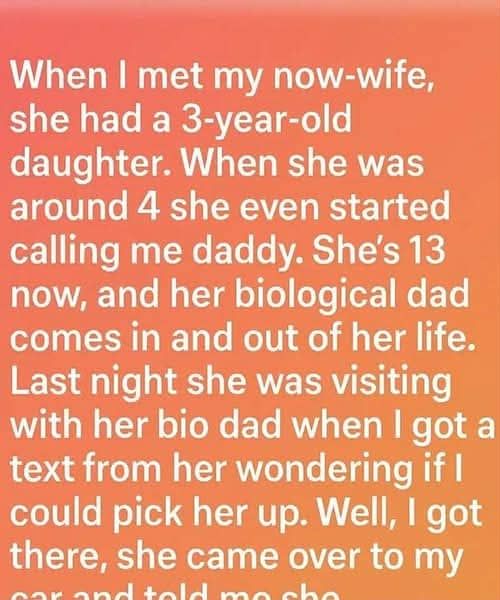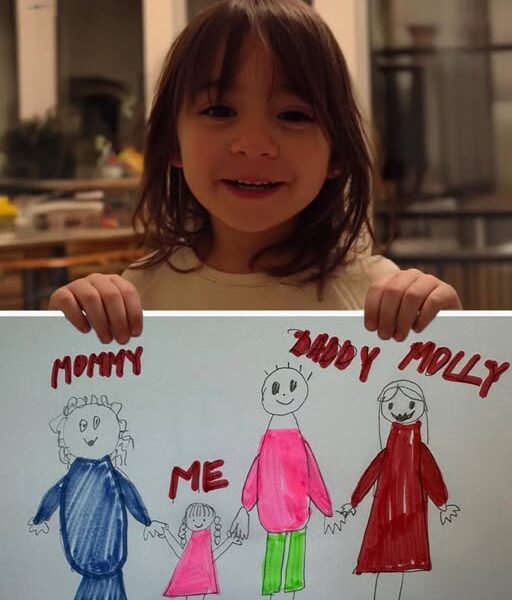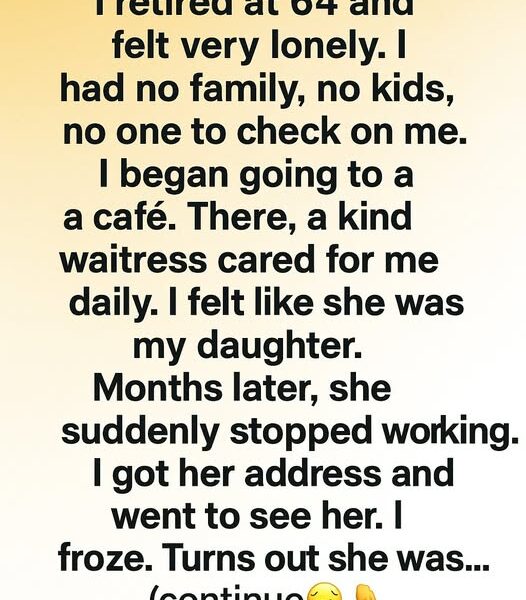When I first stepped into her life, I wasn’t sure what role I would play. I wasn’t her biological father, and part of me wondered if she’d ever truly see me as more than just her mom’s partner. Still, I knew one thing for certain — I wanted to be there for her, in whatever way she needed.
Children have a way of humbling you. They teach you things you didn’t know you needed to learn — about patience, presence, and the quiet kind of love that doesn’t ask for recognition.
The first time she called me “Daddy,” she was four. We were at the park. She fell while running toward the swings, scraping her knee on the gravel. I remember kneeling down, ready to clean the wound, when she reached out her little hand and said it so naturally, like it had always been true: “Daddy, it hurts.”
I froze. I hadn’t earned that word, at least not in the traditional sense. I never asked her to call me that. But in that single, innocent moment, she gave me something I hadn’t expected — acceptance.
That’s when I realized something life-altering: love doesn’t have to share DNA to be real. Biology might define who brings you into the world, but consistency — showing up, again and again — is what defines who stays in it.
Fast forward nine years. She’s thirteen now — funny, stubborn, brilliant, and occasionally impossible in the way only a teenager can be. She’s also quietly navigating a complicated truth: her biological father drifts in and out of her life like a passing season. He’ll appear suddenly — promising, smiling, trying — and then disappear just as quickly, leaving behind the kind of silence that only children of inconsistency know too well.
She doesn’t talk about it much. But I can see it. The way her shoulders tense when his name comes up, the small hesitations when someone asks about her “dad.” She’s learned not to expect much. And that’s what breaks me most.
One evening, not long ago, I was sitting on the couch half-watching a game when my phone buzzed. It was a text from her: Can you pick me up?
No context. No emoji. Just five words.
I didn’t ask questions. I just grabbed my keys and drove.
When I pulled up outside her friend’s house, she was standing there under the streetlight with a small backpack at her feet. She wasn’t crying, but her face told the story — something had gone wrong. I rolled down the window.
“Hey, kiddo,” I said. “Hop in.”
She climbed into the passenger seat, buckled her seatbelt, and stared out the window. We drove in silence for a while. I didn’t press her. Sometimes kids just need space.
After a few minutes, she sighed and said quietly, “Thanks for always coming.”
I glanced over. “Always.”
She nodded, still looking out at the passing streetlights. “I know I can rely on you.”
That one sentence — simple, unpolished — hit me harder than anything I’d ever heard. It wasn’t a grand gesture or a big emotional moment. It was trust, raw and unspoken.
It reminded me that fatherhood isn’t about sharing blood. It’s about showing up — over and over, without needing applause or gratitude. It’s about being the one they know will answer, no matter how late it is or how small the crisis seems.
I’ve watched her grow from a shy little girl clutching a stuffed rabbit into a young woman figuring out who she is. She rolls her eyes now when I give advice, but she still listens. She argues more, but she always circles back. And when life feels too heavy, she still reaches out — sometimes with a text, sometimes with a hug that says everything words can’t.
I’ve learned that parenting isn’t a title you earn once — it’s a choice you keep making. Every day, you decide to love, to forgive, to show up even when you’re tired, even when it’s hard.
That night, after dropping her off at home and watching her head upstairs, I sat in the driveway for a while. The house lights glowed softly through the curtains. It hit me how strange and beautiful life is — how we find our people not by design, but by choice.
She didn’t have to choose me. But she did.
And I didn’t just choose her once when I started dating her mom — I keep choosing her. Every time I show up. Every time I listen. Every time I remind her that she’s not alone.
Her biological father may drift in and out, but I’ve learned that what truly matters isn’t how often you promise — it’s how often you arrive. Consistency builds safety. Predictability builds trust. Love, real love, is just commitment lived out loud.
There’s this quiet rhythm to our bond now. Sunday mornings at the diner. Car rides with bad music and worse singing. Late-night snack raids where we pretend not to wake her mom. These small, seemingly meaningless moments are the glue that hold us together.
People sometimes ask if it’s strange raising a child that isn’t biologically mine. I tell them it’s the most natural thing in the world. Because once a child lets you in, once they trust you enough to depend on you, you stop thinking in terms of “mine” or “not mine.” You just think in terms of ours.
That’s what family is — people who show up and stay.
A few weeks ago, she asked if she could borrow the car when she’s sixteen. I laughed and said, “We’ll talk about it in three years.” She rolled her eyes, but she was smiling. The kind of smile that tells me she feels safe enough to ask.
It’s funny — before her, I thought love was something you earned through grand gestures. Now I know it’s built quietly, in the small repetitions: a ride home, a shared meal, a late-night text answered without hesitation.
Being her father isn’t about replacing anyone — it’s about being the constant she can depend on in a world that sometimes isn’t.
That night in the car, when she said, “Thanks for always coming,” I realized something profound. She wasn’t just thanking me for showing up that evening — she was thanking me for every time before. For every pickup. Every conversation. Every quiet, unremarkable act that told her I’d be there.
And she was right. I will always come.
Because being a father isn’t about blood. It’s about presence. It’s about making a choice — and then making it again, and again, and again.
I chose her once. I choose her still. And the truth is, she chose me right back.
That’s what love really looks like — not perfect, not planned, but steady. The kind that doesn’t need to be said out loud to be understood. The kind that shows up every time you call.


